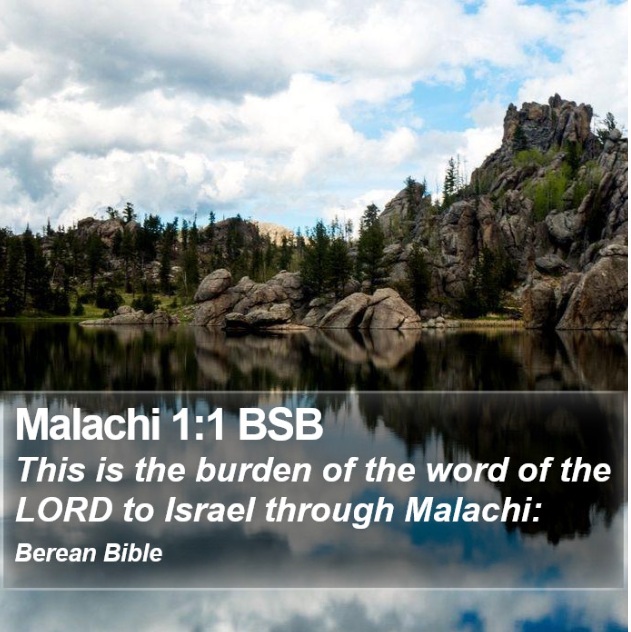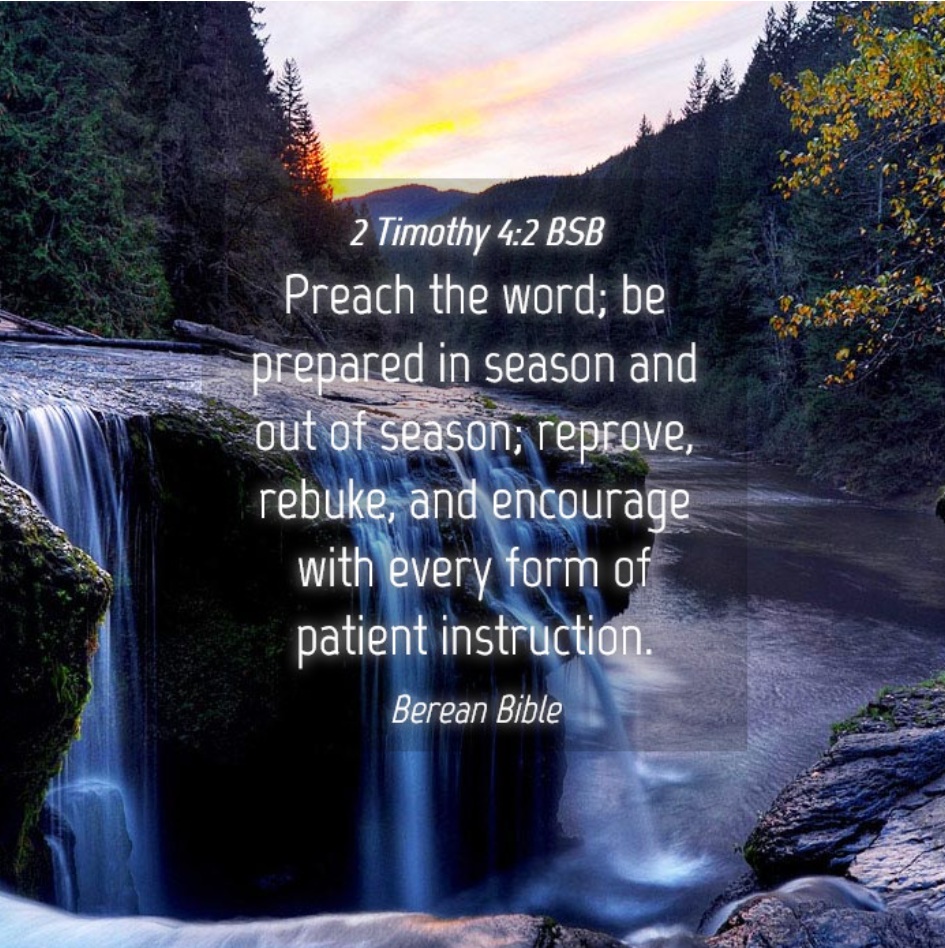“Go therefore and make disciples of all the nations…teaching them to observe all that I commanded you; and lo, I am with you always, even to the end of the age” (Matthew 28:19-20, NASB).
——————–
Contents:
1) “The Burden of Malachi” (Jarrod M. Jacobs)
——————–

-1-
“The Burden of Malachi”
Jarrod M. Jacobs
The book of Malachi was written at a time when God gave His people one last chance to repent before they experienced 400 years when there was “no open vision” from God (to borrow a phrase). Malachi begins with the words, “The burden of the word of the LORD to Israel by Malachi” (Mal. 1:1). The word “burden” means, “a burden or load, figuratively a judgment which lies heavy on a people” (Wilson’s, p. 59). Why was this word a burden? What was this judgment, and why would it lie heavily on the people? Let us read Malachi and discover what God said to His people. Let us also learn the intended lessons and work to ensure these things do not happen to us!
God’s People Did Not Honor Him.
In Malachi 1:6-7, we read, ‘A son honoureth his father, and a servant his master: if then I be a father, where is mine honour? And if I be a master, where is my fear? saith the LORD of hosts unto you, O priests, that despise my name. And ye say, Wherein have we despised thy name? Ye offer polluted bread upon mine altar; and ye say, Wherein have we polluted thee? In that ye say, The table of the LORD is contemptible.” God charges the people with disrespect and dishonoring Him. The Jews ask in verse 7 how this happened, and the Lord answers them by describing the way they were worshipping. They offered polluted, or unclean bread on the altar, and their attitude was one of pride. They also despised the altar. In other words, they gave God the leftovers in their worship! They gave God the least of their time and devotion. This dishonoring of God led to a breakdown in their relationship with Him and the loss of His favor. They focused on this world and its pleasures, rather than looking to God and pleasing Him, and God condemned them for it, warning them of the dire consequences of such actions.
God’s People Were Bored With Worshipping Him.
In verse thirteen of chapter one, God says, “Ye said also, Behold, what a weariness is it! And ye have snuffed at it, saith the LORD of hosts; and ye brought that which was torn, and the lame, and the sick; thus ye brought an offering: should I accept this of your hand? saith the LORD.” These people were not just bored with serving God; they lost the joy and enthusiasm in their worship! They had no intention of pleasing God through sacrifices, and did not want to serve God. Instead of it being a pleasure and privilege to serve the only true and living God, they considered it a burden upon them.
God also condemns how they sacrificed whatever they wanted instead of the best they had. Let us notice what David said in Psalm 122:1. “I was glad when they said unto me, Let us go into the house of the LORD.” This attitude, and not the attitude of those in Malachi’s day, ought to be our attitude today. Let us come to worship with zeal and enthusiasm, just as David did, ready to serve God with all our heart, mind, soul, and strength (Mk. 12:30)! Our worship should be a joyous occasion, a time to connect with God and express our love and devotion to Him (Jn. 4:24).
God’s People Had A Perverted View Of His Character.
In Malachi 2:17, God tells them, “Ye have wearied the LORD with your words. Yet ye say, Wherein have we wearied him? When ye say, Every one that doeth evil is good in the sight of the LORD, and he delighteth in them; or, Where is the God of judgment?” These folks had pushed God to the point that He was disgusted with them (Wilson’s, p. 477). These people had completely perverted the character of God. They taught that God delights in those who do evil. You can see the utter disrespect as they sneered, “Where is the God of judgment?”
Their attitude was not unique, but a resurrection of the attitude of their forefathers. Before the people had gone into exile, God through Isaiah said, “Woe unto them that call evil good, and good evil; that put darkness for light, and light for darkness; that put bitter for sweet, and sweet for bitter! Woe unto them that are wise in their own eyes, and prudent in their own sight!” (Isa. 5:20-21) Woe to those today as well who try to pervert God’s character and scoff at His power and might!
God’s People Robbed Him.
In Malachi 3:8, God accuses, “Will a man rob God? Yet ye have robbed me. But ye say, Wherein have we robbed thee? In tithes and offerings. Ye are cursed with a curse: for ye have robbed me, even this whole nation.” Just as they had defiled the altar, they had also robbed God through their tithes and offerings. They refused to do as God commanded. They did not give as they should, and God was ready to punish them for it. As we read further in this chapter, we notice that these Jews had become very arrogant. “Your words have been stout against me, saith the LORD. Yet ye say, What have we spoken so much against thee? Ye have said, It is vain to serve God: and what profit is it that we have kept his ordinance, and that we have walked mournfully before the LORD of hosts? And now we call the proud happy; yea, they that work wickedness are set up; yea, they that tempt God are even delivered” (Mal. 3:13-15). There is no room in God’s kingdom for those who think they can work wickedly and God will not care, or for those who think He will not punish them for acting that way.
God’s People Were Allowed To Return.
Even at this time, God had not given up on them completely. In Malachi 3:7 God said, “…Return unto me, and I will return unto you, saith the LORD of hosts.” After all God’s people had done, God was still ready to forgive them. He told them to return to Him, and He would return to them when they did. This passage is like James 4:8 which says, “Draw nigh to God, and he will draw nigh to you…” God was still willing to forgive after all the terrible things these people did to God!
In like manner, if we want to be forgiven by God, we must realize that we have sinned (Rom. 3:23), and make our lives right with God through obedience to His word. Despite their arrogance and thievery, God was willing to take them back because He loved them as a man loves his son (Mal. 3:17). God is willing to take us back when we repent (II Pet. 3:9).
God’s People Had A Reward Waiting For Them.
Notice the promise God made to these wicked Jews, “Bring ye all the tithes into the storehouse, that there may be meat in mine house, and prove me now herewith, saith the LORD of hosts, if I will not open you the windows of heaven, and pour you out a blessing, that there shall not be room enough to receive it. And I will rebuke the devourer for your sakes, and he shall not destroy the fruits of your ground; neither shall your vine cast her fruit before the time in the field, saith the LORD of hosts. And all nations shall call you blessed: for ye shall be a delightsome land, saith the LORD of hosts” (Mal. 3:10-12). After their selfishness and unwillingness to serve God, He still was there with out-stretched arms waiting for them. He told them, “…prove me now…” How foolish these people were for not taking God up on His offer.
How foolish people are today, as well. Jesus Christ extends the invitation, “Come unto me, all ye that labour and are heavy laden, and I will give you rest. Take my yoke upon you, and learn of me; for I am meek and lowly in heart: and ye shall find rest unto your souls. For my yoke is easy, and my burden is light” (Matt. 11:28-30). Do not let the cares of this world lead you away from the Truth. Stay grounded and settled in God’s word as long as you live (I Cor. 15:58). Do not become like these people in Malachi’s day (Rom. 15:4; I Cor. 10:11).
— via Articles from the church of Christ in Spenser, Indiana, March 1, 2025
——————–
The Steps That Lead to Eternal Salvation
1) Hear the gospel — for that is how faith comes (Rom. 10:17; John 20:30-31).
2) Believe in the deity of Jesus Christ, the Son of God (John 8:24; John 3:18).
3) Repent of sins. For every accountable person has sinned (Romans 3:23; Romans 3:10), which causes one to be spiritually dead (Ephesians 2:1) and separated from God (Isaiah 59:1-2; Romans 6:23). Therefore, repentance of sin is necessary (Luke 13:5; Acts 17:30). For whether the sin seems great or small, there will still be the same penalty for either (Matt. 12:36-37; 2 Cor. 5:10) — and even for a lie (Rev. 21:8).
4) Confess faith in Christ (Rom. 10:9-10; Acts 8:36-38).
5) Be baptized in water for the remission of sins (Mark 16:16; Acts 2:38; 22:16; 1 Pet. 3:21). This is the final step that puts one into Christ (Gal. 3:26-27). For from that baptism, one is then raised as a new creature (2 Cor. 5:17), having all sins forgiven and beginning a new life as a Christian (Rom. 6:3-4). For the one being baptized does so “through faith in the working of God” (Col. 2:12). In other words, believing that God will keep His word and forgive after one submits to these necessary steps. And now as a Christian, we then need to…
6) Continue in the faith by living for the Lord; for, if not, salvation can be lost (Matt. 24:13; Heb. 10:36-39; Rev. 2:10; 2 Pet. 2:20-22).
——————–
Tebeau Street
CHURCH OF CHRIST
1402 Tebeau Street, Waycross, GA 31501
Sunday: 9 a.m. Bible Classes and 10 a.m. Worship Service
Wednesday (all but the first): 7 p.m. Bible Classes
First Wednesday of the month: 7 p.m. Congregational Song Service (about 45 minutes of singing, followed by a short talk)
evangelist/editor: Tom Edwards (912) 281-9917
Tom@ThomasTEdwards.com
https://thomastedwards.com/go/all.htm (This is a link to the older version of the Gospel Observer website, but with bulletins going back to March 4, 1990.)




